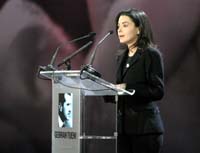 Daily Star , BEIRUT: "Dialogue is the most important thing for Lebanon today," boomed the voice of late MP Gebran Tueni, recorded more than a year ago and aired Sunday at a conference commemorating the slain journalist’s life and media freedoms in the Arab world. For a few brief moments Sunday, the MP and An-Nahar general manager came back to life in front of print journalists gathered to mark the first anniversary of his December 12, 2005 assassination in a car bombing.
Daily Star , BEIRUT: "Dialogue is the most important thing for Lebanon today," boomed the voice of late MP Gebran Tueni, recorded more than a year ago and aired Sunday at a conference commemorating the slain journalist’s life and media freedoms in the Arab world. For a few brief moments Sunday, the MP and An-Nahar general manager came back to life in front of print journalists gathered to mark the first anniversary of his December 12, 2005 assassination in a car bombing.
"People accuse the Lebanese media of dividing Lebanon, but it is Lebanon’s political leaders that have ripped the country apart," a taped interview from the 1980s showed a younger Tueni saying. A photo of recently assassinated Industry Minister Pierre Gemayel and Tueni smiling at each other evoked a standing ovation from the hundreds of attendees, including politicians – among whom was Yassin Jaber, representing Speaker Nabih Berri – religious leaders from all sects, and relatives of both Tueni and Gemayel. "I swear, there will never be another civil war in Lebanon," rang another clip from Tueni.
On cue, the late MP’s daughter Nayla, who currently heads An-Nahar, appeared on stage to repeat her father’s vow. "Good morning Gebran, good morning father," she said gently. "What are you doing now? Do you write and read like you usually do? Are you sitting with other martyrs discussing politics and the future?"
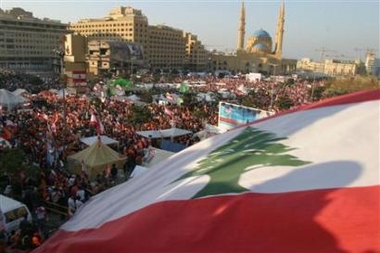 Al-Jazeerah, December 10, 2006 The Lebanese opposition composed of supporters of Hizbullah, Amal, Michel Awn, Franjiyeh, and Talal Arslan staged their largest protest ever. Lebanese army officers estimated it as hundreds of thousands filling Riyadh Al-Sulh Square, Martyrs Square, and nearby streets, bringing Beirut to a standstill.
Al-Jazeerah, December 10, 2006 The Lebanese opposition composed of supporters of Hizbullah, Amal, Michel Awn, Franjiyeh, and Talal Arslan staged their largest protest ever. Lebanese army officers estimated it as hundreds of thousands filling Riyadh Al-Sulh Square, Martyrs Square, and nearby streets, bringing Beirut to a standstill.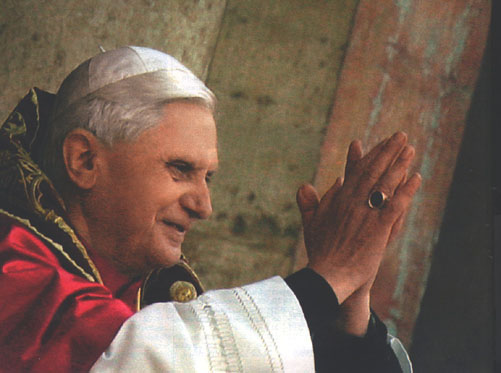 Rome, Dec. 11, 2006 (CWNews.com) – Pope Benedict XVI voiced his concerns about the Middle East, and particularly about Lebanon, during his Angelus audience on Sunday, December 10. Speaking to large crowd of about 40,000 people in St. Peter
Rome, Dec. 11, 2006 (CWNews.com) – Pope Benedict XVI voiced his concerns about the Middle East, and particularly about Lebanon, during his Angelus audience on Sunday, December 10. Speaking to large crowd of about 40,000 people in St. Peter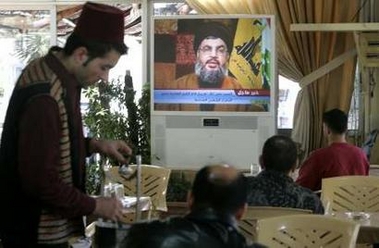 By Anthony Shadid, Washington Post, Two of Lebanon’s most powerful television stations played to their crowd. Future Television, loyal to Hariri and his Sunni constituency, devoted extensive coverage to the counterprotests in Tripoli. Hezbollah’s Al-Manar, calling the protests in Beirut “an unprecedented popular flood,” aired four scenes simultaneously of the crowds surging downtown. The broadcast was laced with the vocabulary of the summer war with Israel: victory, steadfastness and salvation.“People who survived 33 days of war in the south have no problem staying here for a year, or even two,” said Nada Mroueh, joining protesters flying flags that denoted their affiliation — yellow for Hezbollah, orange for Aoun, green for Amal. “Is it wrong to ask for our rights? Is Siniora more Lebanese than us? We are Lebanese, too.”
By Anthony Shadid, Washington Post, Two of Lebanon’s most powerful television stations played to their crowd. Future Television, loyal to Hariri and his Sunni constituency, devoted extensive coverage to the counterprotests in Tripoli. Hezbollah’s Al-Manar, calling the protests in Beirut “an unprecedented popular flood,” aired four scenes simultaneously of the crowds surging downtown. The broadcast was laced with the vocabulary of the summer war with Israel: victory, steadfastness and salvation.“People who survived 33 days of war in the south have no problem staying here for a year, or even two,” said Nada Mroueh, joining protesters flying flags that denoted their affiliation — yellow for Hezbollah, orange for Aoun, green for Amal. “Is it wrong to ask for our rights? Is Siniora more Lebanese than us? We are Lebanese, too.”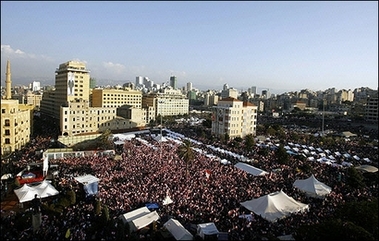 BEIRUT (AFP) – Lebanon’s divided factions are aiming for a political compromise after mass protests led by the opposition overwhelmed Beirut and raised fears of a return to civil strife. The protracted deadlock has paralyzed the government, opposition have clogged the capital in an escalating campaign to force a new national unity administration.
BEIRUT (AFP) – Lebanon’s divided factions are aiming for a political compromise after mass protests led by the opposition overwhelmed Beirut and raised fears of a return to civil strife. The protracted deadlock has paralyzed the government, opposition have clogged the capital in an escalating campaign to force a new national unity administration.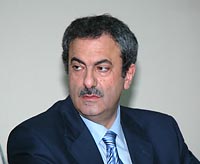 Magazine entretien Farid Elias el Khazen
Magazine entretien Farid Elias el Khazen 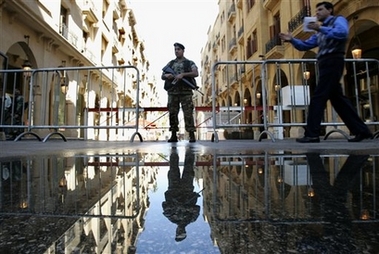 by Nayla Razzouk,
by Nayla Razzouk, 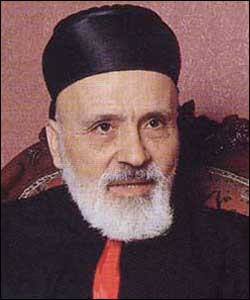 Daily star
Daily star 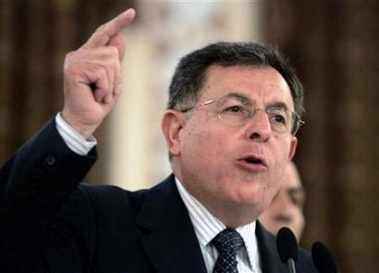 By Crispian Balmer ,
By Crispian Balmer , 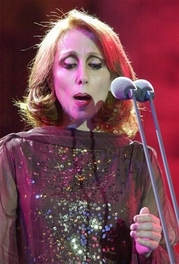 By DONNA ABU-NASR, Associated Press Writer , BEIRUT, Lebanon – Her voice brought together under one roof both supporters of the beleaguered government and opponents trying to topple it. Yet in this tense country, sharp disputes break out even at a performance by Fairouz, Lebanon’s premier diva and the star of a musical about a corrupt government. Last weekend’s three-night run of "Sah el-Nom," loosely translated as "A Good Night’s Sleep," was supposed to open an annual summer festival in the ancient city of Baalbek. Israel’s July-August offensive on Lebanon forced organizers to postpone until December, hoping that by then calm would prevail.But opening night coincided with a new crisis that many fear could tear apart the country
By DONNA ABU-NASR, Associated Press Writer , BEIRUT, Lebanon – Her voice brought together under one roof both supporters of the beleaguered government and opponents trying to topple it. Yet in this tense country, sharp disputes break out even at a performance by Fairouz, Lebanon’s premier diva and the star of a musical about a corrupt government. Last weekend’s three-night run of "Sah el-Nom," loosely translated as "A Good Night’s Sleep," was supposed to open an annual summer festival in the ancient city of Baalbek. Israel’s July-August offensive on Lebanon forced organizers to postpone until December, hoping that by then calm would prevail.But opening night coincided with a new crisis that many fear could tear apart the country 


